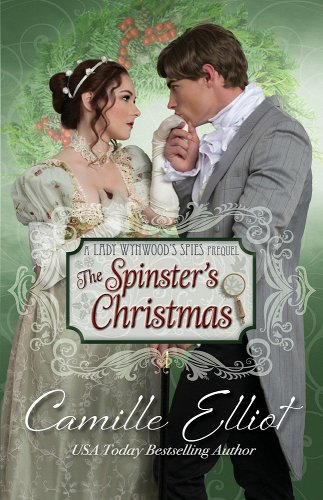Title: The Spinster's Christmas
Author: Camille Elliot
Publisher: Camille Elliot
Quote: "It is hardy cowardly to wish to avoid the machinations of a desperate woman."
So says an older aristocrat who doesn't get many lines or much action in this novel, but who will be a recurring character in the Lady Wynwood's Spies series, to which this is the prequel. Little does he know that, as the plot develops, he'll be speaking for two younger members of the English gentry, Gerard, a disabled veteran, and Miranda, a poor relation whose emotional life has been scarred by the guilty secret that she inadvertently ruined the life of one of her father's servants--back when he had servants. Perhaps it was her fault that he couldn't afford them any more. Miranda accepts staying with relatives who treat her as an inferior, even a slave, at least not until a particularly arrogant cousin plans to send her to stay with an uncle who she's quite sure intends to rape her. Then she appeals to more distant connections, Laura (Lady Wynwood) and Gerard, to help find her a position as a nurserymaid in a nicer house.
Gerard doesn't feel that he's recovered enough strength to support a wife, and the girls he knows are pretty blatantly so much more interested in his property than in him that they'd probably prefer to be his widow than his wife. Somehow he just doesn't want good old Miranda, a childhood friend, condemned to the dead-end job of nurserymaid in London. But can he protect Miranda? Does Miranda need protection? How the two determine that Gerard is at least a worthwhile sidekick for Miranda to have is the plot of the novel. Because it's a romance, you know they'll end up together.
Regency Romances aren't usually Christian. The Regency was a period when England was proud of being a Christian nation, but individuals other than clergymen seem to have said and written little about their religious lives. As a culture England was ripe for the revival the Wesleys would start. Individuals, however, probably were religious in quiet ways--what Jane Austen or Charlotte Bronte might have described as "serious." In this series Laura Wynwood and the men who quietly help her quietly fight the crime wave of this historical period are "serious" Christians. Their Christian counsel is an essential part of Gerard's and Miranda's courtship.
Is this story more believable than any Regency Romance? Did anyone ever believe any Regency Romance was true? Don't we all know people whose "but then, just when I most needed X, X happened" stories are true? Most people who drop out of trees don't drop into waiting arms and, if we do, the drop into a friend's waiting arms involves the same amount of dangerous gravity as the drop onto a rock, or the ground, or a dense rosebush. Some people who drop out of trees, nevertheless, survive landing on any of those things. This period, when Napoleon and the United States and Dick Turpin and so many of the splendid English Eccentrics were the real-world news, when readers wanted stories to be true and belittled the "gothick" stories that were obviously fiction, really was a time for the saying "Truth is stranger than fiction."
Let's just say I'm now interested in reading anything else written by the author known, depending on what she's writing, as Camille Elliot or Camy Tang.

No comments:
Post a Comment